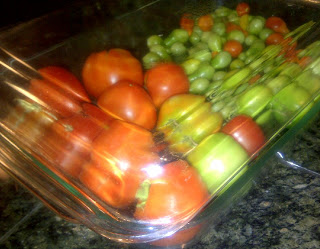My mother’s culinary creations evolved in concert with the progression of her life.
She never owned a cookbook. She carried nothing tangible forward from the destruction
of her past into her life in the present. In many ways, the obliteration wrought by the
Holocaust she survived deleted my history as well. Foods she cooked were grounded
in her recollections of life in Romania before World War II, not in recipes scribbled on
yellowing or stained note-cards handed down from grandmother to mother to daughter
or from aunts to nieces and beyond.
When I’m in my kitchen, I reminisce about the meals entirely unique to my
mother – ones my brother and I still challenge each other to reproduce. My mother’s
cooking spanned the range of our economic status - poverty to plenty and all that lies
between. Those memories weave the responses I proffer to friends and strangers alike,
who ask, “Why do you cook?” or “Who taught you to cook?”
I cook a great deal, blog about cooking, watch shows about cooking when
the world news is replete with tales of destruction.
I write articles about cooking that
occasionally are published. I’ve even taught cooking!
Can I answer these seemingly straight-forward questions but not ruminate
about women passing their recipes and cooking secrets on to their progeny? At
times I’m compelled to ask: who did teach my mother to cook? My mother – the smart
young woman from an Orthodox Jewish family growing up in a remote Romanian
village; my rebellious mother who pursued education in lieu of culinary skills during
the era, historically, when Jewish girls married young and rarely ventured beyond their
garden gates.
My mother couldn’t learn from her mother - one of millions of mothers
and “would-be” mothers killed in places bearing names like Dachau or Auschwitz or
Ravensbruck.
So what is my answer? It’s not one but a complex web of answers!
I cook to create what reminds me of the scent of home and the security of family.
I cook because cooking distracts me from life’s problems as I become absorbed by the
ingredients’ sensory elements.
I cook because going to a restaurant when I’m tired or
harried does the chef a disservice and deprives my taste buds of due appreciation. I
cook because it’s the consummate way I can show family and guests that I care about
them - a hug around our most basic senses and with the power to unite strangers.
Cooking, tasting and memory become inseparable.
I cook to celebrate spring’s intense colors; newly ripened berries, crisp baby
greens, and delicate young vegetables picked before they’ve grown large and tough.
I cook as an adieu to vestiges of summer, to welcome fall’s heartiness with pumpkins,
apples, peaches and squash.
I’ll reconfigure fall’s bounty into spreads and soups and
pies. They’ll become the flavors of summer that live on in my kitchen to help brace me
for winter ahead, a winter of short days and cold, early evenings.
I cook to boost my self-esteem of which a part depends upon being better at one
thing than anyone else in my family is - a family comprised of men who know everything
about most things yet vastly less about cooking than I do. I cook as my avenue to
creativity like the many short stories I write and books I savor.
I cook to progress in life.
Cooking is progressive. And, as I progress, I know that all those meals I’ve cooked over
the years will help my sons remember me when they’re far away or I’m no longer here.
I cook to invent and to be creative. Then, I reinvent, edit and test again - exactly
as I reinvent myself each morning and with each edit of my stories. I cook as a way to challenge myself to grow, to travel the world, and to befriend it by meeting the foods and flavors of unfamiliar lands and cultures. And when I do, I inhale their scents, touch the delicate and coarse and if ever the opportunity to visit arrives – well, then their familiarity will welcome me in like a friend inviting me to a meal.
I cook because it provides an exceptional avenue into understanding others – observing what they will or won’t eat, like and dislike. Not to cook would render me incomplete; not cooking would deprive my senses of one of life’s crucial components. I cook to nurture myself and those around me, to calm and sooth, to make merry and celebrate.
Cooking legitimates my sporadic excursions into ethnic neighborhoods and out-of-the way markets where I become a student of foreign spices, herbs and aromas, a discoverer of sauces and pastes, cookies and cakes. The vendors’ sounds are simultaneously familiar and unfamiliar. In their tones, I recall childhood’s long forgotten memories; the French farmers coming to sell their goods in my Montreal old French Quarter neighborhood. Mine are the memories of Polish butchers selling homemade sausages, Jewish immigrants hawking kosher pickles and apple strudels and Greeks
peddling aromatic herbs and unfamiliar cheeses.
When my table is cleared and all who’ve graced it are content, I know that every reason I cook is intertwined with me understanding who I am, what I’m capable of, and discovering not what I can do with ingredients at hand but, most important, all I can do without yet still being satiated and whole, continuing to impart what I’ve learned to those for whom I’ll cook.



